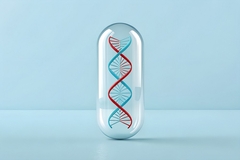Researchers explore effects of plant-based diets on children’s bone metabolism

A new study has found that vegan children and adults have an adequate dietary intake of calcium, protein, and vitamin D levels, which is important for bone health. However, key differences include bone metabolism and lower protein levels compared to omnivorous eaters.
The study in the European Journal of Nutrition links vegan and vegetarian diets to accelerated bone metabolism. These eating patterns were associated with higher concentrations of bone formation and resorption markers, according to the researchers at the University of Helsinki, Finland.
However, Docent Suvi Itkonen from the university’s Faculty of Agriculture and Forestry notes: “The calcium naturally occurring in plant-based foods is fairly poorly absorbed.”
“In fact, the widespread vitamin D and calcium fortification of plant-based dairy alternatives in Finland is important for the adequate intake of these nutrients among vegans and, consequently, for their bone health.”
Vegan diets high in vitamin D
The MIRA2 study involved children between ages 2–7 living in Helsinki and following a vegan, vegetarian, or omnivorous diet, including their caregivers.
It reveals that children on a vegan diet have higher vitamin D levels than those on an omnivorous or a vegetarian diet, as they more actively consume vitamin D supplements with higher doses than the omnivore group.
 While those on higher plant-based diets had higher bone formation concentration and resorption markers, they were also linked with higher levels of parathyroid.Vitamin D levels in blood were adequate across all diet groups, say the researchers. Vegan children also have adequate levels of calcium intake.
While those on higher plant-based diets had higher bone formation concentration and resorption markers, they were also linked with higher levels of parathyroid.Vitamin D levels in blood were adequate across all diet groups, say the researchers. Vegan children also have adequate levels of calcium intake.
Plant-based diet nutrient absorption
While those on higher plant-based diets had higher bone formation concentration and resorption markers, they were also linked with higher levels of parathyroid. This hormone is associated with more active bone resorption.
The researchers observe that this may indicate long-term negative effects on bone health, although the clinical significance is unclear.
They point out that several global studies on the potentially adverse effects of vegan diets on bone health show that the vitamin D intake of their study populations and the vegan options available on the market are low. Also, consumption of fortified foods or supplements is lower than in Finland.
Meanwhile, the researchers found vegan and vegetarian diets were lower in protein compared to those following an omnivorous diet, but were adequate, on average.
“It’s possible that the poorer absorption and different amino acid composition of plant-based proteins compared to animal proteins partly explain the observed differences in bone metabolism, but more research is needed on the topic,” says Itkonen.
“In fact, we will next investigate amino acid intake among the MIRA2 subjects and the amino acid composition of vegan diets.” This is because proteins are composed of amino acids.
Filling nutrient gaps in Helsinki’s “veggie bubble”
The researchers note that Helsinki offers vegan food in daycare centers and that various food products are widely available. The participants’ families were also knowledgeable about vitamin D supplementation and fortified food guidelines.
“People in the Helsinki Metropolitan Area live in a kind of veggie bubble. Due to that, one has to keep in mind that the findings of the study are not directly applicable to the populations of other regions or countries,” warns Itkonen.
He cautions that if a food is entirely excluded from a diet, it is important to replace it nutritionally. The researchers advise planning out a vegan diet for children and adolescents with a registered dietitian. “In terms of bone health, it is essential when consuming plant-based drinks and yogurt-like products to choose the option fortified with calcium and vitamin D,” comments Itkonen.
“Children should take a daily vitamin D supplement throughout the year. If the daily diet contains no margarines, dairy products, or plant-based drinks fortified with vitamin D, and if fish is eaten less than 2–3 times per week, it’s important to ensure adequate vitamin D intake, especially during the dark season, by taking a vitamin D supplement. Among vegans, the need for vitamin D supplementation is common.”
Research on vegan diets
In other plant-based research, the Physicians Committee for Responsible Medicine recently found that a low-fat vegan diet significantly decreases dietary acid load compared to a Mediterranean diet. The randomized crossover trial also affirmed that this diet — consisting of leafy greens, berries, and legumes — may promote weight loss and a healthy gut microbiome.
Meanwhile, US research suggests that vegan diets during weight training do not impact muscle building. It concluded that following plant- or animal-based diets made no difference in muscle protein synthesis.
Nutrition Insight recently met with PlantFusion’s CEO to discuss how the company explores combinations of new, plant-based sources and occasionally supplements with vegan amino acids to create complete, sustainable protein powders with a taste and texture consumers expect.


















